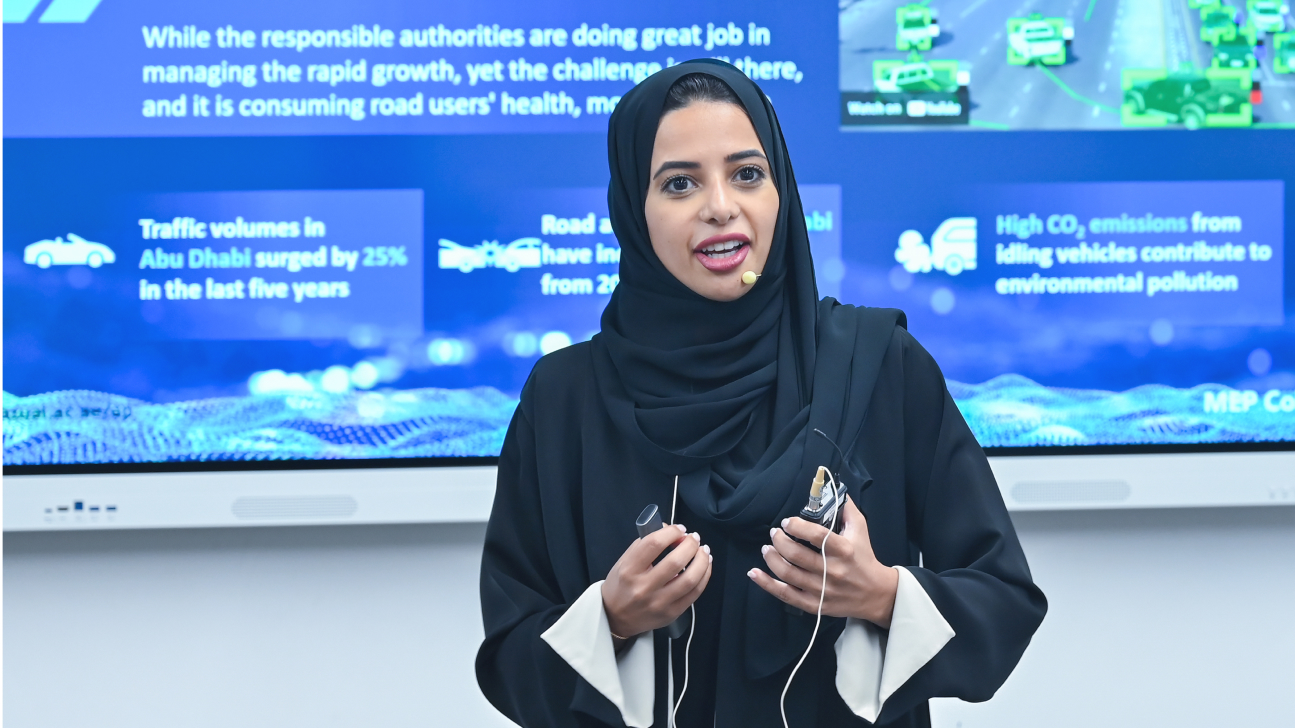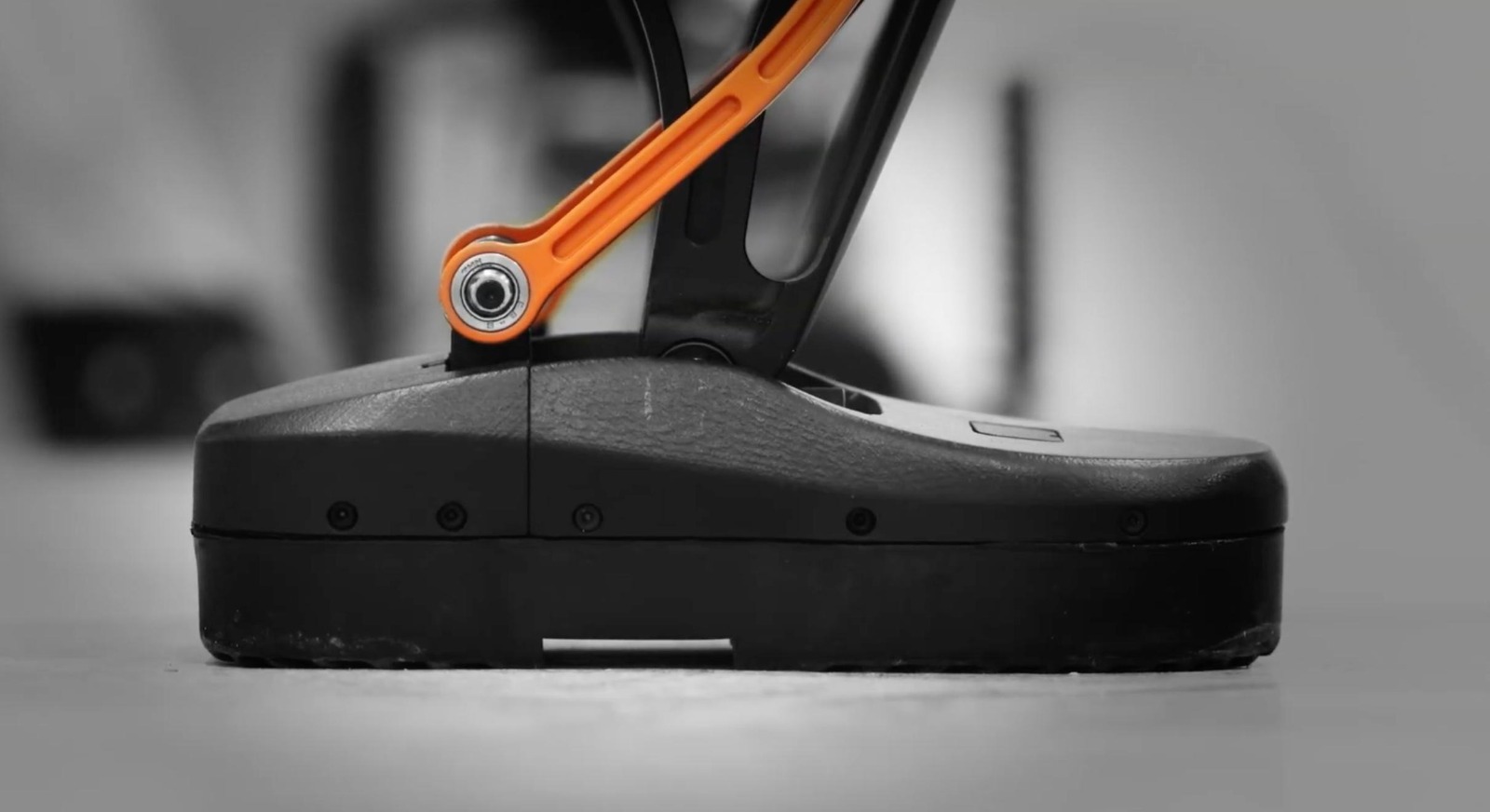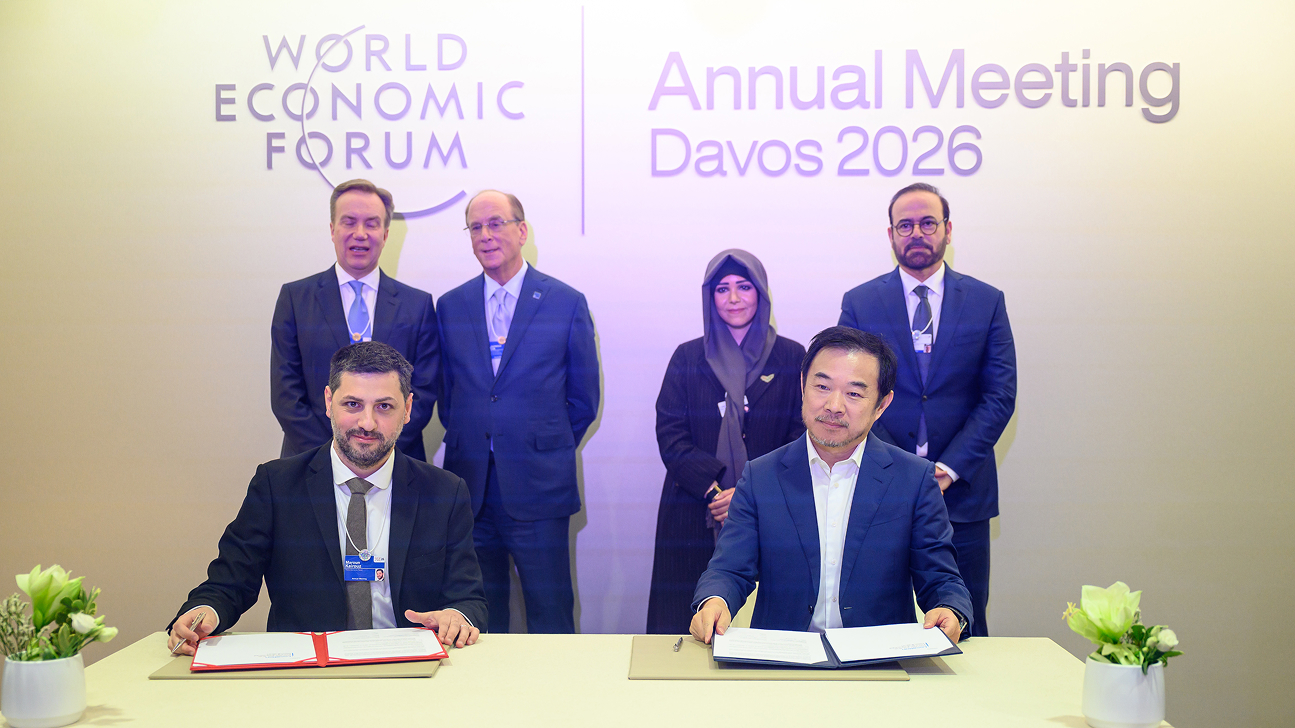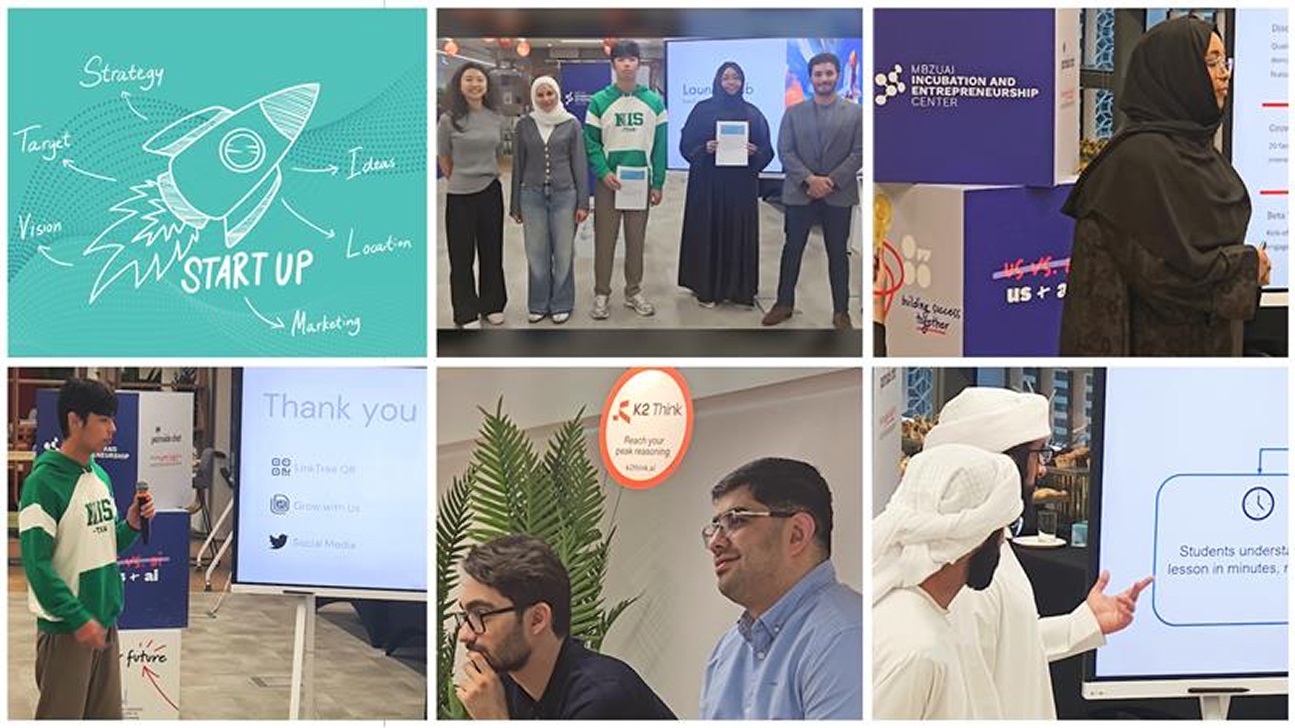How the MBZUAI Executive Program is helping shape the future of the UAE
Tuesday, September 17, 2024

When the fifth edition of the MBZUAI Executive Program concluded in July, it did so with the genesis of six innovative ideas that could help change the lives of people across the UAE.
Some 44 leaders from the public and private sectors joined cohort 5 of the MEP, learning from the cream of the AI crop over 16 weeks, including instructors from MBZUAI, UC Berkeley, Oxford University, Harvard, MIT, and other leading institutions and organisations.
Modules focused on AI and its current paradigm shift, AI fundamentals, AI-driven industry changes, and AI strategy, policymaking and ethics, but it was the program’s Capstone Projects that brought their learning together in a way that could have a lasting impact on the UAE and beyond.
The Capstone Projects challenged students to use AI to help solve national or organizational challenges with the potential to bring about transformational change in society; all under the theme of sustainability. The students were divided into six groups, with two groups in each of three clusters entitled Towards Sustainable Solutions, Sustainable Human Centric Wellbeing, and Sustainable Digital Services. Each group was supported by an MBZUAI professor and Ph.D. student or specialist to guide their process and application of AI.
Personalizing education in schools
Group one focused on sustainable digital solutions, with a project to implement an AI-driven personalized learning platform across UAE schools.
[wps_image-left image=”https://staticcdn.mbzuai.ac.ae/mbzuaiwpprd01/2024/09/MEP-Noora-Alshamsi-1.jpg” caption=” ” first-paragraph=” ”We selected education as our focus because it plays a critical role in shaping the future of any nation, especially in the UAE where innovation and knowledge-based progress are central to national development,” says Sheikha Noora Alshamsi, head of leadership training at Emirates School Establishment.” second-paragraph=””Our goal was to leverage AI to create a more personalized learning experience that empowers students to reach their full potential. We wanted to address the gaps in individualized education by offering solutions that adapt to each student’s unique learning style and pace ultimately fostering a generation equipped to lead in a rapidly evolving world.””]
The group used advanced machine learning, natural language processing, and adaptive technologies to create a platform that offers real-time feedback and personalized content, in a bid to enhance engagement and learning outcomes.
“By using AI to enhance the learning process. our project supports the national strategy to equip the future workforce with the skills needed to thrive in a competitive technology-driven world,” adds Sheikha Noora Alshamsi.
“The potential impact on the UAE population is significant — students will benefit from more tailored education, leading to better outcomes, while educators will be empowered with tools that can help them better serve diverse student needs.”
Addressing chronic diseases
Group two, working under the banner of Sustainable Human Centric Wellbeing, developed a platform called iGenek.
[wps_image-right image=”https://staticcdn.mbzuai.ac.ae/mbzuaiwpprd01/2024/09/Pitch-Day-iGenek.jpg” caption=” ” first-paragraph=”“The problem that we were trying to address is that chronic diseases are increasing among the UAE national population,” says Khalifa Al Shamsi, chief financial officer at Abu Dhabi Health Services Company (SEHA).” second-paragraph=” “I was surprised to learn that 20% of the UAE national population suffers with either cardiovascular diseases, diabetes or obesity, and that healthcare spending in the UAE has a CAGR of almost 10% post-COVID.””]
iGenek seeks to personalize preventative healthcare by informing individuals about their risk profiles for these three diseases and promoting lifestyle changes and comprehensive care. The solution integrates data from the Emirati Genome Program, electronic medical records, patient surveys, and wearable devices, using genetic information to offer practical health advice.
“We wanted to integrate all this data and group the patients into risk profiles,” explains Al Shamsi. “Mass data verification using AI technology can identify a patient at risk, and then the iGenek app can provide them with personalised lifestyle recommendations.
“Our healthcare system is reactionary at present: We usually interfere when the damage has already happened. If you look at the UAE’s 2031 vision, it outlines that the healthcare system in the future needs to be predictive, use genome data, and live with AI technology. I believe our solution meets all of these elements.”
Transforming traffic management
Part of the Towards Sustainable Ecosystems cluster, the third group’s project – Ain Abu Dhabi – was an innovative AI-powered smart traffic management solution to improve traffic management and road planning.
[wps_image-left image=”https://staticcdn.mbzuai.ac.ae/mbzuaiwpprd01/2024/09/Pitch-Day-Ain-Abu-Dhabi-2.jpg” caption=” ” first-paragraph=”“We had some criteria that we agreed on for choosing our Capstone Project,” says Ahmed Al Shaikh Al Zaabi, executive director at Modon. “First, it should be applicable nationwide and not require large capital budget to be invested. Second was a quick implementation timeline. And third that it should enable for future development and expansion. We as a team agreed on an AI-powered smart traffic management system due to the availability of major infrastructure needed, and the relatively short implementation timeline.” ” second-paragraph=” “]
With traffic volume in Abu Dhabi rising by 25% in the past five years, the group wanted to build a solution that would enhance road safety, reduce congestion, improve incident responses, and optimise traffic efficiency. Their idea was to take data from road cameras, toll gates and road sensors in order to provide real-time monitoring, predictive analytics, and dynamic signal control. Which, Al Zaabi explains, requires a collaborative effort between different stakeholders.
“We approached entities that are working on similar solutions — most of which are working in limited collaboration and not benefitting from the full potential of their solution. We wanted to create a collaborative solution that would work with all entities and provide a base for a future centralised system for the UAE government.
“From there, our mentor and advisor helped us fine tune our solution and choose the right AI solution, which was deep machine learning, to make sure we were implementing the right solution, and that it will help expand to next phases in the future. This solution is not only applicable for traffic management but designed and enabled to be expanded into security, food security, the environment, and more.”
Driving research forward
In a bid to enhance the competitiveness of the UAE”s research and development ecosystem, group four came up with Drive71, an AI-powered platform that aims to bridge the gaps between academia, industry, investors, and the government.
[wps_image-right image=”https://staticcdn.mbzuai.ac.ae/mbzuaiwpprd01/2024/09/Pitch-Day-Drive71-1.jpg” caption=” ” first-paragraph=”Working within the Sustainable Digital Services cluster, the group sought to build on R&D entities introduced by the UAE in recent years — the Emirates Research and Development Council, and the Advanced Technology Research Council.” second-paragraph=” “We assessed the challenges and opportunities within R&D, and noticed that rather than working in a traditional, manual way, we could use AI solutions to predict the challenges organizers or entities might face, and the kind of areas they need to prioritise before they allocate any resources,” says Dr Khadeeja Al Faqeeh, strategy expert at the Advanced Technology Research Council.”]
“We wanted to bring together different stakeholders such as the private sector, academia and government, and get them to collaborate and use AI to find the top priorities that will tackle national challenges in the country, which will mean they are spending money on the things that will touch people’s lives and make their lives easier. Of course this can be done manually, but with AI everything is accelerated, which is why we called our project Drive71.”
Identifying sporting talent
Group five, part of the Sustainable Human-Centric Wellbeing cluster, explored how to elevate the UAE’s sporting talent, focusing on early identification of young athletes.
[wps_image-left image=”https://staticcdn.mbzuai.ac.ae/mbzuaiwpprd01/2024/09/Pitch-Day-FalconVision-1.jpg” caption=” ” first-paragraph=” ”The challenge we aimed to address was the ability to detect athletic potential in children,” explains Maryam Ahmed Hassani, Head of Trends and Innovation at the Abu Dhabi Early Childhood Authority.” second-paragraph=” ”Historically, the UAE has had the ambition to compete in sports internationally, and with the evolution of technology, there may be better approaches to achieving that ambition. To start, we decided to investigate why the UAE has less representation and fewer medals compared to other countries in the region.” “]
After discussions with key stakeholders, including the National Olympic Committee, the General Authority of Sports, and parents, the team identified a major gap in talent detection. With the UAE aiming to have over 30 athletes in the 2032 Olympics (up from 14 in 2024), a reimagined approach was necessary.
The solution was FalconVision, an AI-powered app designed to detect athletic potential in children aged six to 14. Easily integrated into schools, FalconVision leverages computer vision for physical assessments, including posture and speed, aptitude surveys for coachability, and genetic testing enabled by the Emirati Genome Program.
FalconVision will collect and process athletic data through machine learning models to predict high-potential athletes. This data will then be shared with government and private sector partners, such as Elite Sports UAE, for further athlete development.
“Identification is just the beginning,” adds Hassani. “Once a wide pool of talent is identified, they can embark on a 10-15 year training journey, ultimately preparing them to compete on the global stage.”
This phased approach ensures that talent is not only detected early but nurtured into top-tier athletes, driving the UAE’s ambitions of becoming a sports powerhouse and achieving both social and economic prosperity.
Empowering UAE agriculture
The focus for group six was to build an AI-driven platform to enhance agricultural productivity and sustainability in the UAE. Working as part of the Towards Sustainable Ecosystems cluster, their solution was Bastana.
[wps_image-right image=”https://staticcdn.mbzuai.ac.ae/mbzuaiwpprd01/2024/09/Pitch-day-Bastana.jpg” caption=” ” first-paragraph=”“Our problem statement was the availability of data in agriculture and creating sustainable agriculture from the data collected,” says Yaser Alshehhi, chief information officer of Nawah Energy Company. “How can we solve for prediction issues, for example? How can we bring together the data that will help us with climate changes?” second-paragraph=” “]
“Today in the UAE every farmer has a mobile phone, so if we can incentivize them to take images and send information, that’s one way we could get data. And farms already have their own soil data, groundwater data, and other data that we could benefit from. We have a lot of avenues for data that aren’t being used widely yet.”
Through Bastana, data from soil sensors, weather stations, satellite imagery and market data bases would provide stakeholders with insights on crop types, water management, soil suitability, and other factors, with the aim of increasing crop yields, efficient resource use, enhanced food security, and environmental sustainability.
“We narrowed the focus to agriculture, but there is the potential to expand it to dairy products, livestock, and other areas of food security,” adds Alshehhi. “The more we talk about the different issues that emerge, the more we can use AI to find solutions.”
To test the validity of their concepts, the six groups were put through their paces at the MEP Idea Launchpad Pitch Day, hosted by Dr. Ahmed Dabbagh, director of professional services at MBZUAI.
The groups presented their projects to a jury panel that featured AI leaders from across the UAE, including His Excellency Dr. Mohamed Al Kuwaiti, head of cyber security for the UAE Government; Her Excellency Dr. Moza Suwaidan, CEO of digital applications and platforms sector at Digital Dubai; Professor Sami Haddadin, vice president for research and professor of robotics at MBZUAI; Dena Al Mansoori, group chief AI and data officer at e&; and Zaid Mohamed, director of strategic portfolio office, part of the chairman’s office at the Abu Dhabi Department of Government Enablement.
Those projects that have sound potential could go to to be the basis for further exploration and development — a possibility that validates the MEP as a hotbed of innovation, based on the bringing together of diverse industry leaders, and equipping them with the power of AI.
Related
MBZUAI and Minerva Humanoids announce strategic research partnership to advance humanoid robotics for applications in the energy sector
The partnership will facilitate the development of next-generation humanoid robotics tailored for safety-critical industrial operations.
Read MoreMBZUAI signs agreement with World Economic Forum as Centre for the Fourth Industrial Revolution (C4IR)
MBZUAI will launch the Centre for Intelligent Future as a global platform – connecting AI research with.....
- social ,
- humanity ,
- economic ,
- WEF ,
- World Economic Forum ,
- partnership ,
MBZUAI's Launch Lab equips alumni and students with practical startup tools
The six-week pilot program brought alumni and students together to turn early startup ideas into tangible ventures.
- entrepreneurship ,
- launch lab ,
- alumni relations ,
- startups ,
- alumni ,


